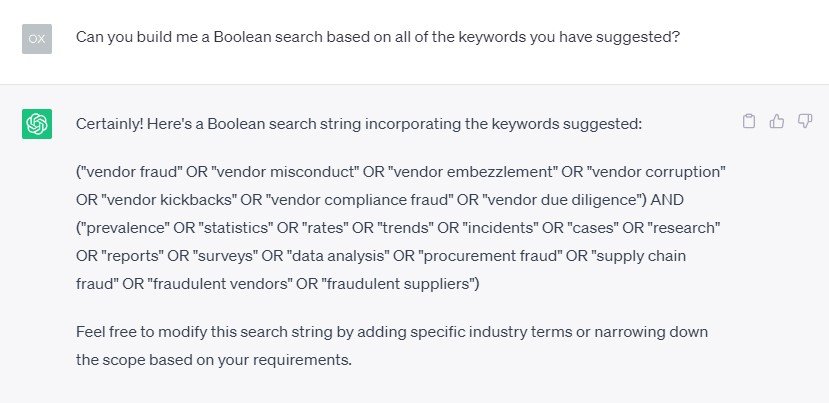ChatGPT Use Cases for Investigations
Investigators can and should automate manual tasks using artificial intelligence. Bad actors have already been doing it
ChatGPT serves as a tool to support the investigation process and generate hypotheses or leads that can be further validated through traditional investigative techniques and collaboration with experts in the field. Here are a few examples of how ChatGPT can be applied in fraud investigations:
Research Help: ChatGPT can be used to provide detailed instructions on how to find information on people and companies. For example, an investigator can ask “How do I search for birth and death records in San Francisco?”, get a link to the San Francisco Department of Public Health, and find instructions for every step.
Boolean Queries: ChatGPT can provide specific keywords and queries based on the topic of the investigation to avoid the manual work of building queries in Google. Investigators can ask “I am looking for data on the prevalence of vendor fraud. Suggest keywords that I can use to find this information” and “Build a Boolean search based on the suggested keywords”
Document or Data Summaries: ChatGPT can read massive amounts of data and provide bullet points and short descriptions. It can read legal and court documents, police reports, witness statements, emails, messages, and other documents. It also can analyze financial data and show patterns. The initial queries can be simple, for example, “Summarize the document with bullet points” or “Find patterns in the dataset” and become more detailed with specific data uncovered
Templates: ChatGPT can write drafts for pretty much any legal or security documents, like a cease-and-desist letter, investigation report, violence prevention policy, court motions, and similar documents used in the investigative process.
Limitations
All ChatGPT responses must be verified and cross-referenced with other sources. AI can produce hallucinations and it has biases, so using unverified information can affect an investigation. ChatGPT will not provide the most updated information, their data is limited to 2021. It also cannot provide information on people unless they are well-known personas.
It’s very important to be specific about a request, and include instructions on how to retrieve information. For example, users can ask to exclude personal opinions or speculations or provide links for every source used. Sometimes, small changes to a prompt can give significantly different results.
Although I used ChatGPT as an example in this post, many other AI chat bots are available out there and they can provide better or worse results.

